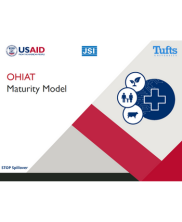One Health is a collaborative, multisectoral, and transdisciplinary approach — working at the local, regional, national, and global levels — with the goal of achieving optimal health outcomes, recognizing the interconnection between people, animals, plants, and their shared environment. One Health is both an approach and an outcome – optimal health for people, animals, plants, and their shared environment – that is a public good.
One Health is not a new concept, but its adoption has been hampered by fragmented policy-making and financing, and by siloed organizational structures. One Health is an umbrella concept encompassing all disciplines that broadly deal with human health, animal health, and the surrounding environment. The modern origins of One Health date back to 2004. One Health was introduced as part of the 12 Manhattan Principles, which called for an international, interdisciplinary approach for preventing diseases, specifically animal-human transmissible and communicable diseases. Therefore, systematic perspectives on life sciences and the environment (ie, interactions and coinfluences within the environment) were brought together to design and implement programs, policies, and regulations for achieving better public health outcomes.
ODH aims to facilitate and improve collaboration among practitioners in One Health and digital health communities. This collaboration will allow both communities to benefit from efficient interactions over time and the delivery of near–real-time, data-driven contributions to systems medicine and systems ecology. This will also allow citizens to engage with their individual health and well-being. Move beyond the classical One Health topics, going beyond reactively identifying and controlling disease threats, but aiming to understand and tackle the root causes of the increasing zoonotic spill-over risks by looking into land-use changes, environmental degradation, agricultural practices, community behaviour, and animal welfare.
One Health requires interdisciplinary expertise and political commitment to move from concept to policy and from policy to practice. Capacity building and educational programmes are growing globally, creating the One Health workforce urgently required to effectively control and prevent the health challenges at the human-animal-environment interface.


